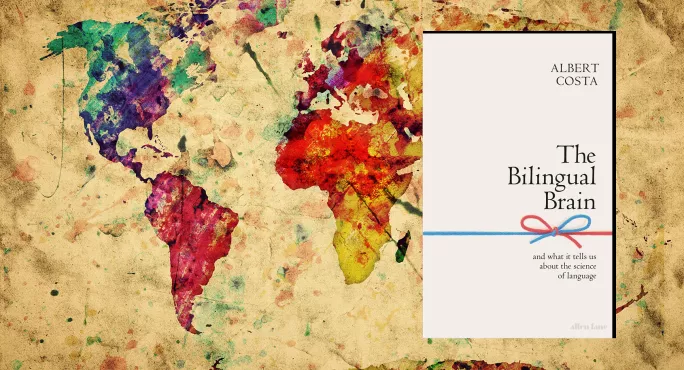- Home
- Book review: The Bilingual Brain
Book review: The Bilingual Brain

The Bilingual Brain: And what it tells us about the science of language
Author: Albert Costa
Publisher: Allen Lane
Details: 176pp; £20
ISBN: 978-0241391518
Bilingualism is now the norm globally, which means that bilingual language development is the default for most of the world’s population.
Despite this, many countries (notably, English-speaking ones such as the UK) tend to adopt a monolingual mindset in thinking about educational provision.
In England, just under 22 per cent of the primary-school population has English as an additional language, meaning they come to school with knowledge of another language, but at the same time learn English through their educational experiences.
It makes a lot of sense then for educators (and others) to familiarise themselves with the basic science underpinning what we know about bilingual language development. Albert Costa’s book is an excellent place to start.
Major findings in bilingualism research
Costa was a talented researcher, whose work addressed key questions in bilingualism. But, sadly, this English version of the Spanish volume (2017) is posthumous.
It makes it all the more poignant, then, that we have such a wonderful legacy from him of some of the major findings in bilingualism research of the past few decades, humanely and humorously presented.
Bilingualism is an active field and growing all the time, which means that Costa has made decisions about what to include and what not to include.
Because the book is written in a clear and companionable way, it feels like a conversation with Costa, in which he enthusiastically regales us with tales from the world of bilingualism.
This is a huge accomplishment, because language is, in and of itself, an incredibly complicated beast, with multiple layers just describing the “what” of language.
A whole host of variables
When talking about two languages, and some of the key findings in the research field addressing multiple languages, we’re in a really complex world.
Luckily, Costa has written the book in such a way that one does not need a degree in a cognate discipline, nor a good understanding of research design and methodology, to engage with the content.
The content predictably begins at the start of human experience: explaining how bilingual babies (that is, babies who are set on the path towards bilingualism from birth) process and come to learn two different linguistic systems.
He reviews very cool neuro-imaging studies, which illustrate that the same areas of the brain and activation patterns in monolinguals are evident in bilinguals.
Yet, at the same time, there are some interesting differences, which might relate to a whole host of variables (such as how competent the individual is in their respective languages).
A juggling act
Costa uses the metaphor of juggling to describe how bilinguals manage their two linguistic systems, sometimes inhibiting one in favour of the other (for example, cognitive control).
He describes some evidence that speaks to the issue of whether and why bilinguals might be better language learners (that is: knowing two languages might mean that learning a third is easier for them than for the monolingual to learn a second).
And he also discusses the evidence suggesting that bilinguals might have certain cognitive advantages over monolinguals. For example, it may be that bilingual children develop theory of mind (the ability to take the perspective of others) earlier than monolingual children.
The area of cognitive advantages in bilinguals is one under significant scrutiny and debate. Costa deals with this deftly in describing some of the key studies, but also acknowledging the complexity of debate and differing opinions.
In the final chapter, he reviews how emotions and processes are influenced by the language in which we are engaged. He tells us about his famous work concerning utilitarian judgements, and how these kinds of decisions vary as a function of the language in which the participant completes the task.
The wonder of the human brain
The research Costa reviews demonstrates the wonder of the human brain, and how we need to understand cognitive development and bilingual language development more thoroughly than we do at present.
Indeed, most of the research that underpins all of human psychological research is based (largely) on a monolingual norm.
I would argue that, given most people in the world are bilingual, and given the nuanced ways in which bilinguals may present different patterns of performance across different tasks, we should be using them as a default in our research studies.
Anyone with an inquisitive mind and an interest in language in general, and certainly bilingualism specifically, will find this book a compelling read.
It is a fascinating primer on the science of language, and reveals an understanding of how researchers go about the incredibly complex but highly rewarding task of figuring out what constitutes bilingualism.
Costa presents numerous interesting findings, which tell us something about bilingualism, but also about what an incredible organ the brain is, that we can do what we do in multiple languages.
The Bilingual Brain is an accessible, informative volume, which helps foster a better appreciation and understanding of the fascinating research in bilingualism.
Given that educators will have bilingual students in their classes, it is a good volume to read to appreciate their world.
Victoria Murphy is professor of applied linguistics at the University of Oxford. She is the author of Second Language Learning in the Early School Years Trends and Contexts, published by Oxford University Press
Keep reading for just £1 per month
You've reached your limit of free articles this month. Subscribe for £1 per month for three months and get:
- Unlimited access to all Tes magazine content
- Exclusive subscriber-only stories
- Award-winning email newsletters